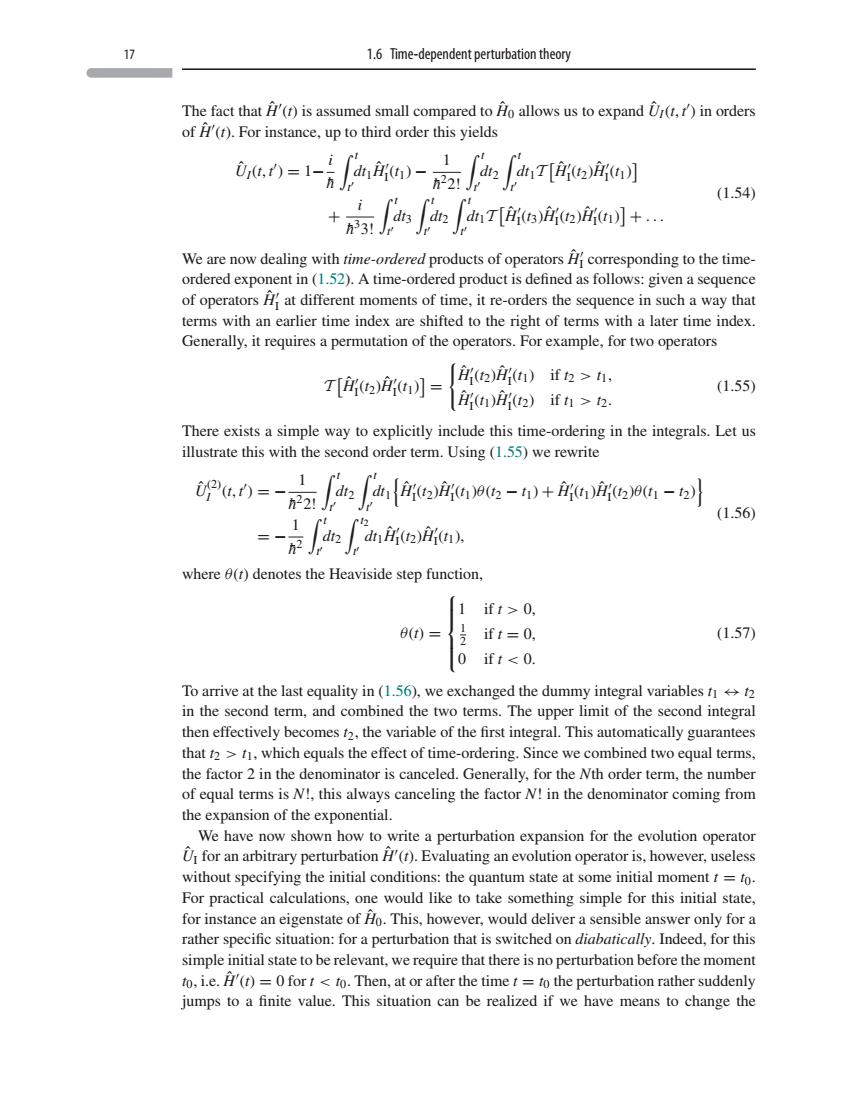正在加载图片...

1.6Time-dependent thry The fact that P()is assumed small compared to Ho allows us to expand )in orders of A(r).For instance,up to third order this yields u=1-片解-一aTa创 (1.54 +话画西s+ 。 We are now dealing with rime-ordered products of operators Acorresponding to the time ordered exponent in(1.52).A time-ordered product is defined as follows:given a sequence of operatorsat different m ments of time.it re-orders the sequence in such a way that terms with an earlier time index are shifted to the right of terms with a later time index. Generally,it requires a permutation of the operators.For example,for two operators T[2)】= a2)m)f2>, (1.55) )u2)if1>2. There exists a simple way to explicitly include this time-ordering in the integrals.Let us illustrate this with the second order term.Using(1.55)we rewrite 2u,0=- /a-+9u- (1.56 where(denotes the Heaviside step function 1if1>0. 0={3ift=0. (1.57) 0 ift<0. To arrive at the last equality in(1.56).we exchanged the dummy integral variablesn in the second term,and combined the two terms.The upper limit of the second integral then effectively becomes2.the variable of the first integral.This automatically guarantees that 2>.which equals the effect of time-ordering.Since we combined two equal terms the factor2inhe nator is canceled.Gen ly.for the Nth order ne nu of!this always canceling the factor N!in the denominator coming from the expansion of the exponential. We have now shown how to write a perturbation expansion for the evolution operator U for an arbitrary perturbation A().Evaluating an evolution operator is,however,useless without specifying the initial conditions:the quantum state at some initial moment=o For practical would like to take something simple for this initial state for instance an eigenstate of Ho.This,however,would deliver a sensible answer only for a rather specific situation:for a perturbation that is switched on diabarically.Indeed,for this simple initial state to be relevant,we require that there is no perturbation before the moment .rafer the timethe perturbation rather suddenly jumps to a finite value This situation can be ealized if we ave means to change the 17 1.6 Time-dependent perturbation theory The fact that Hˆ (t) is assumed small compared to Hˆ 0 allows us to expand Uˆ I(t, t ) in orders of Hˆ (t). For instance, up to third order this yields Uˆ I(t, t ) = 1− i h¯ t t dt1Hˆ I(t1) − 1 h¯ 22! t t dt2 t t dt1T Hˆ I(t2)Hˆ I(t1) + i h¯ 33! t t dt3 t t dt2 t t dt1T Hˆ I(t3)Hˆ I(t2)Hˆ I(t1) + ... (1.54) We are now dealing with time-ordered products of operators Hˆ I corresponding to the timeordered exponent in (1.52). A time-ordered product is defined as follows: given a sequence of operators Hˆ I at different moments of time, it re-orders the sequence in such a way that terms with an earlier time index are shifted to the right of terms with a later time index. Generally, it requires a permutation of the operators. For example, for two operators T Hˆ I(t2)Hˆ I(t1) = Hˆ I (t2)Hˆ I (t1) if t2 > t1, Hˆ I (t1)Hˆ I (t2) if t1 > t2. (1.55) There exists a simple way to explicitly include this time-ordering in the integrals. Let us illustrate this with the second order term. Using (1.55) we rewrite Uˆ (2) I (t, t ) = − 1 h¯ 22! t t dt2 t t dt1 Hˆ I(t2)Hˆ I(t1)θ(t2 − t1) + Hˆ I(t1)Hˆ I(t2)θ(t1 − t2)
= − 1 h¯ 2 t t dt2 t2 t dt1Hˆ I(t2)Hˆ I(t1), (1.56) where θ(t) denotes the Heaviside step function, θ(t) = ⎧ ⎪⎪⎨ ⎪⎪⎩ 1 if t > 0, 1 2 if t = 0, 0 if t < 0. (1.57) To arrive at the last equality in (1.56), we exchanged the dummy integral variables t1 ↔ t2 in the second term, and combined the two terms. The upper limit of the second integral then effectively becomes t2, the variable of the first integral. This automatically guarantees that t2 > t1, which equals the effect of time-ordering. Since we combined two equal terms, the factor 2 in the denominator is canceled. Generally, for the Nth order term, the number of equal terms is N!, this always canceling the factor N! in the denominator coming from the expansion of the exponential. We have now shown how to write a perturbation expansion for the evolution operator Uˆ I for an arbitrary perturbation Hˆ (t). Evaluating an evolution operator is, however, useless without specifying the initial conditions: the quantum state at some initial moment t = t0. For practical calculations, one would like to take something simple for this initial state, for instance an eigenstate of Hˆ 0. This, however, would deliver a sensible answer only for a rather specific situation: for a perturbation that is switched on diabatically. Indeed, for this simple initial state to be relevant, we require that there is no perturbation before the moment t0, i.e. Hˆ (t) = 0 for t < t0. Then, at or after the time t = t0 the perturbation rather suddenly jumps to a finite value. This situation can be realized if we have means to change the�����������